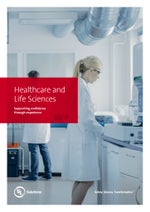
Medical Testing Services Overview Brochure (English)
Validated sterilization processes to eliminate or reduce the risk of infections.

Medical device manufacturers that manufacture sterile devices must produce their products under adequate and microbiologically monitored conditions. Furthermore, the final products, including their packaging, must be subjected to bioburden determinations in order to support the later sterilization success. For devices with an invasive application, endotoxin testing is necessary in order to evaluate the related risk.
Medical devices that are intended for reuse and require processing to take them from their state after clinical use to the state of being ready for their next use, which may include one or more cleaning, disinfection and sterilization or single-use medical devices that require processing before use and are intended to be used in a clean, disinfected or sterile state need to be supplied with detailed processing instructions in order to minimize the risks of transmission of infectious agents.
Microbiological testing for medical devices is important as medical devices contaminated with pathogens may be a source of infection for humans. According to the Medical Device Regulation, devices and their manufacturing process shall be designed in such a way as to eliminate or to reduce as far as possible the risk of infection to patients, users and, where applicable, other persons.
The requirements of cleaning, disinfection, and sterilization processes for medical devices can be divided into two product categories:
Based on ISO 13485, all these processes need to be subjected to validation studies.
With our validated tests methods, which we perform in an accredited UL Solutions laboratory, we can support your validation studies and work with you on a combination of different tests, as needed. Our team offers expert evaluations in:
We offer a full range of medical device testing services to support your needs. From design to aftermarket, our scientists and toxicologists can help you demonstrate safety and mitigate the risk for your medical devices.
Evaluation is one of the key steps in the medical device life cycle, and we can help you evaluate your medical devices in accordance with national and global standards. Our familiarity with these standards makes for a seamless and trustworthy evaluation process.
Thanks for your interest in our products and services. Let's collect some information so we can connect you with the right person.